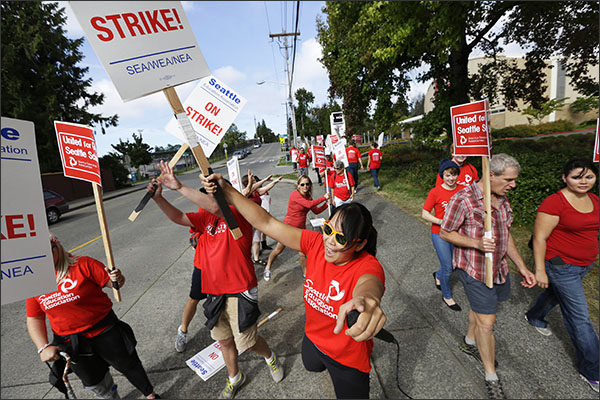Washington state should be acknowledging the many different routes to growing one’s work qualifications, including on-the-job training and advancement, apprenticeships, internships, vocational training and life experiences. A college education is not always the way to acquire skills that are pertinent to a state job. As the Harvard Business School put it, “Jobs do not require four-year degrees. Employers do.”
Thankfully, Gov. Jay Inslee is on board with the idea that a college-degree requirement on a job posting can limit qualified applicants. He is among a growing number of governors, both Republican and Democrat, doing something to open up their state workforces.
While Inslee hasn’t issued an executive order to end the four-year degree requirement in most state jobs, as Gov. Josh Shapiro, D-Pennsylvania, made a splash doing in January, he has asked the state’s human resources team to work toward ensuring state jobs are free from unnecessary barriers that can limit the state’s workforce and undervalue what applicants bring to the table. That team is at work, offering best practices to hiring managers in the state and looking for more ways to reach a wider group of prospective employees.
Barriers can include, but aren’t limited to, an unnecessary college-degree requirement. Other barriers? The state is looking at ways to make job announcements more welcoming to people intimidated by certain wording or a list of desired qualities, for example. The state HR team is also looking into ways to open up interviews to untraditional times of the day. This could bring in more qualified job seekers.
Right now, the state doesn’t require degrees for any job where one isn’t required by law (e.g. a medical degree is required to practice medicine, etc.). However, a governor spokesperson told me that some hiring managers in various state agencies might still choose to include degree requirements.
Michaela Doelman, the state’s chief human resources officer, told me she thinks less than 20% of state job openings have a college-degree requirement when they needn’t. Often, desired qualifications include a “this or that” description, allowing for certain experience or a college degree to be acceptable. With the best practices that have been issued, that 20% might go down even lower.
“We want a government workforce that is effective,” Doelman said. “This is about relooking at the system and redesigning it so people can demonstrate if they are qualified to do the work.” She added that the state is trying to get rid of an assumption that there is only one way to get skills and qualifications.
I look forward to state leaders opening more doors to qualified applicants. It will also help the state fulfill its service role to taxpayers, attracting the best talent available.
State hiring should be based on skills and abilities needed for a position, without automatically excluding those who don’t hold a college degree.






